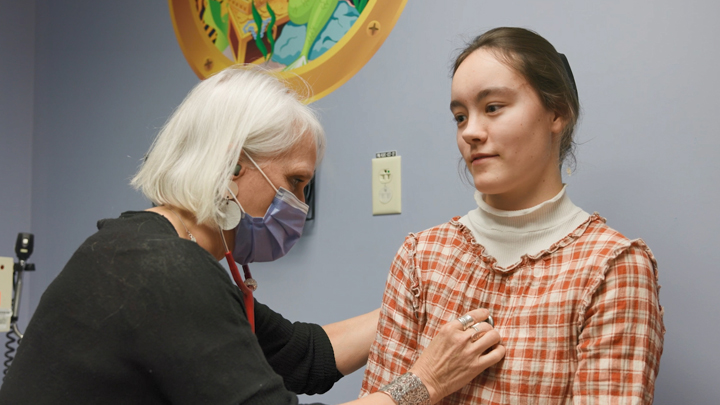
May 20, 2024

Dr. Lisa Hornberger listens to Brooke Rempel’s heart, after a new pulmonary valve was implanted. Photo by Evan Isbister.
Story by Marni Kuhlmann | Photo and video by Evan Isbister
EDMONTON — At 16, Brooke Rempel has become part of an important ‘first’ at the Stollery Children’s Hospital and the University of Alberta Hospital’s Mazankowski Alberta Heart Institute. She’s the first pediatric patient in Western Canada, and the first ever patient in Alberta, to have a self-expanding pulmonary valve implanted in her heart.
“It was very exciting to us to be able to do this without open-heart surgery, with the new technology,” says Brooke’s dad, Eldon Rempel. “It’s advancement in medicine.”
Transcatheter pulmonary valve replacements were first introduced nearly 20 years ago in Canada. The procedure is a non-surgical option to restore pulmonary valve function, eliminating the need for open-heart surgery in many patients.
However, the traditional balloon-expanding valves are not an option for some patients whose anatomy isn’t a good fit. For these patients, open heart-surgery was still the only option, until recently, when self-expanding valves were approved by Health Canada.
“This technology is important because it gives us the ability to decrease the number of overall open-heart surgeries that the patients will require over a lifetime,” says Dr. Iman Naimi, the Pediatric and Congenital Interventional Cardiologist who implanted Brooke’s valve, along with a team of experts at the Maz.
Naimi adds that patients with more complex pulmonary valve conditions have often had previous surgeries. Their options become limited when valve leakage leads to heart dilation over time. In these patients, the new self-expanding valves could be an option, instead of another open-heart surgery.
Because transcatheter pulmonary valve replacements are minimally invasive, patients enjoy a much faster and easier recovery than with open-heart surgery.
“It’s the difference between days in the hospital, pain, discomfort and other complications they can develop with bypass and open-heart surgery, versus doing something while their heart is pumping,” says Dr. Naimi. “It’s a day procedure and they go home the next day.”
“The recovery is amazing,” says Dr. Hornberger, Divisional director of Pediatric Cardiology at the Stollery, and Brooke’s cardiologist. “Within a day or two, they’re up and around, they say, ‘Wow I feel like I different person, I feel like I have more energy.’ It’s remarkable.”
“It was very quick. It was even quicker than I expected,” says Eldon Rempel. “The procedure was done and the following day my daughter was discharged from hospital, and we went home.”
“It was awesome,” says patient Brooke. “I didn’t have to spend all those days in hospital so I could do other things. I didn’t do as much the next few days, but soon I was doing everything like normal. I felt a lot better.”
“It’s very exciting,” adds Dr. Hornberger. “Mostly because it’s about doing the best we can for our kids. Getting kids home faster, having a quicker recovery, having longevity, and not needing another intervention.
“When we can push forward and have a success story like this and think, ‘Wow, we’re going to continue to do better for our patients,’ it’s exciting.”